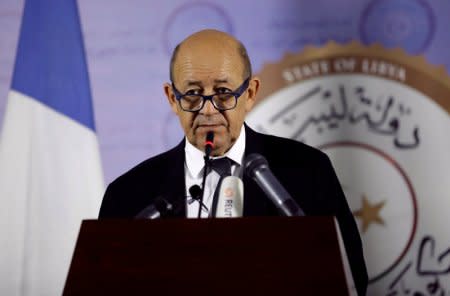EU vows to save Iran deal, fears for North Korea mediation

Thomson Reuters
By Robin Emmott and Gabriela Baczynska
LUXEMBOURG (Reuters) - The European Union vowed on Monday to defend a 2015 nuclear deal between Iran and world powers and urged U.S. lawmakers not to reimpose sanctions after President Donald Trump chose not to certify Tehran's compliance with the accord.
Germany and France led a chorus of warnings to the United States, normally the EU's closest foreign policy ally, that any weakening of the agreement to prevent Iran obtaining nuclear weapons could have serious consequences for peace.
"As Europeans together, we are very worried that the decision of the U.S. president could lead us back into military confrontation with Iran," German Foreign Minister Sigmar Gabriel told reporters at a meeting with his EU counterparts.
EU foreign policy chief Federica Mogherini, who chaired the final phase of the 2015 negotiations, held closed-door talks on how the 28-nation bloc should proceed and ministers were also set to discuss how to tackle Iran's ballistic missile program.
Mogherini has insisted the nuclear deal is working, while the International Atomic Energy Agency (IAEA) says Iran is complying. Trump has dubbed it "the worst deal ever negotiated".
"Non-proliferation is a major element of world security and rupturing that would be extremely damaging," French Foreign Minister Jean-Yves Le Drian told reporters. "We hope that Congress does not put this accord in jeopardy."
The European Union already has members of Iran's Islamic Revolutionary Guard Corps under sanctions, which Trump on Friday singled out as he detailed a more aggressive approach to Tehran.
While NATO has a newly-installed missile shield in Romania to potentially shoot down any Iranian rockets, EU governments want to see Tehran dismantle its growing arsenal. Tehran says the rockets are for purely defensive purposes.
But while several EU governments, including the Netherlands and Britain, said Iran's ballistic missiles and Tehran's interventions in Syria and Yemen were a concern, ministers said the immediate focus had to be saving the 2015 deal.
Negotiated after 12 years of talks that EU diplomats helped to initiate and carry through, the accord with Iran is the most significant diplomatic success for the bloc in several decades.
NORTH KOREA SPILLOVER
Many worry that the EU's reputation as an honest broker in a host of future conflicts may not recover if the U.S. Congress reimposes sanctions on Iran and causes the deal to collapse.
Most U.N. and Western sanctions were lifted more than 18 months ago under the deal. Tehran is still subject to a U.N. arms embargo, which is not part of the deal.
At their meeting in Luxembourg, the EU's foreign ministers are also due to approve a new round of economic sanctions on North Korea after Pyongyang's nuclear test last month. Many governments still hold out hope of repeating the Iran deal with North Korea.
Sweden is one of only seven EU countries with an embassy in Pyongyang and its foreign minister, Margot Wallstrom, reiterated that Stockholm could be counted on to help negotiate if asked.
But Germany's Gabriel warned that Trump's decision not to certify the Iran accord could put any such scenario in doubt.
"My concern is that, if we want to talk to North Korea now, the possible end for the nuclear deal with Iran would jeopardize the credibility of such treaties," Gabriel said.
(Additional reporting by Peter Maushagen in Luxembourg and Lily Cusack in Brussels; Editing by Gareth Jones)
See Also:

 Yahoo News
Yahoo News 
